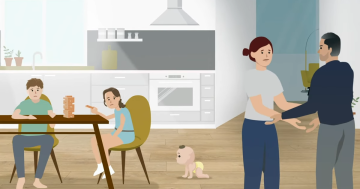
One in six women and one in 16 men experience family and domestic violence in their lifetime. Photo: File.
There are steps small businesses can take now to prepare to offer paid family and domestic violence leave while still in the grace period, according to a leading ACT lawyer.
Paid family and domestic violence leave came into effect on 23 February nationwide, but businesses with fewer than 15 staff members will have to comply by 1 August.
The bill replaced the unpaid leave offered to victims of family and domestic violence.
DDCS Lawyers partner Julie Dobinson said some businesses might be underestimating the chances of their staff being impacted.
“Family and domestic violence disproportionately impact women,” she said.
“Our workplace is unusual for a law firm in that only about 13 per cent of employees are men. But many industries tend to have higher proportions of women.
“In those businesses, there’s a real chance that at least someone in the team will be impacted in some way over time by family and domestic violence.”
It was important to note that the rights also extended to casual employees.
“I think that’s a great aspect of this bill,” Ms Dobinson said.
“There are a lot more casual and part-time workers post-COVID and again, that is a gendered population.”
Ms Dobinson said the new legislation’s benefits reached beyond the victims of family and domestic violence to the broader community and businesses.
“The social context of it is that we have tended, as a society and in workplaces, to treat family and domestic violence as an individual problem when really, it’s a social problem because the impacts ripple across workplaces and schools, and it’s really at epidemic proportions in Australia,” she said.
“Let’s consider the facts. One in six women and one in 16 men experience family and domestic violence in their lifetime. In Australia, sadly, every 10 days a woman is murdered by her partner or former partner.
“In many cases, the people experiencing domestic violence feel shameful about it, leading to short and long-term impacts of poorer mental health and wellbeing. From an employer’s point of view that trauma can lead to lower workplace engagement and productivity and increased absenteeism.”

DDCS Lawyers managing partner Julie Dobinson said offering paid family and domestic violence leave was beneficial for employers in both the social and financial sense. Photo: DDCS Lawyers.
Employees experiencing family and domestic violence needed understanding workplaces, and that would have positive flow-on effects for their employers, according to Ms Dobinson.
“A workplace that understands the complex nature of family violence supports people, and if people are supported and able to access this leave, it’s overall likely to lead to lower turnover, which is a great thing for businesses,” she said.
“In the long run, the cost of losing and replacing someone due to family and domestic violence can outweigh the cost of supporting that person during that difficult time.
“If you can keep someone who has been trained with you, by assisting them to get through their experience of domestic violence, then overall it’s more likely a net gain for employers.”
Employees who need to claim paid family and domestic violence leave will need to put a request in writing and explain the reason. The employer then has 21 days to respond to the request.
Not all ten days of paid family and domestic violence leave must be claimed consecutively, so it can be divided out as needed to address the various requirements of achieving stability following family and domestic violence.
Ms Dobinson said that for those uncertain about their obligations, the Fair Work ACT and Fair Work Ombudsman had useful online materials, including a guide to family and domestic violence.
“It sets out some really helpful things including your legal responsibilities as a small business employer and how it relates to overall workplace health and safety obligations,” she said.
“It also includes checklists and a framework for an employer of a small business to deal with staff members who they suspect or who have revealed they’ve been impacted by family or domestic violence.
“If you need further clarity on the paid family and domestic violence leave either as an employee or employer, it’s worth consulting a lawyer.”





















